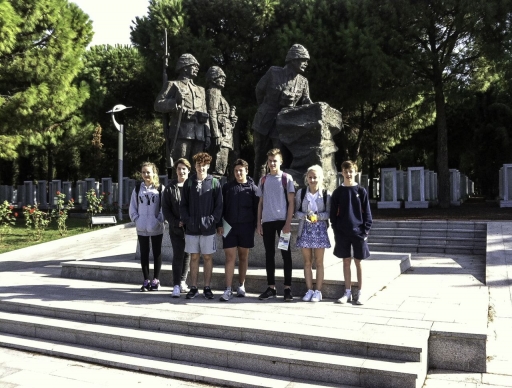Students from two schools in Edinburgh have visited the battlefields of Gallipoli as part of the Gallipoli Centenary Education Project, a UK-based venture remembering the Dardanelles campaign.
The tour included the graves and memorials of some of the soldiers from their local area, including troops named on each school’s roll-of-honour.
The pupils, aged 15-16, also had the opportunity to meet Turkish counterparts from the Çanakkale brahim Bodur Anatolian High School to exchange views on the First World War in the Dardanelles.
This was the second visit to Gallipoli organised by the Gallipoli Centenary Education Project. National coordinator Robin Clutterbuck welcomed the opportunity to take Scottish students: “Thousands of Scottish soldiers went to Gallipoli and many never came back,” he explains.
“The Scottish government has included the Gallipoli campaign as a key part of its commemorations programme so it is fitting that we should be taking Edinburgh schools to the peninsula this year. Indeed the schools have been partly subsidised by the government’s Battlefield Visits Programme and we understand are the only schools to go to Gallipoli within this scheme.”
Pupils from Portobello High School and Leith Academy took part. The Leith Academy pupils were selected as representatives of a group who researched the backgrounds of soldiers killed in the Quintinshill rail disaster.
More than 200 men of the Royal Scots, on their way to fight at Gallipoli, died in May 1915 when their troop train was involved in a head-on collision near Gretna, on the border between Scotland and England.
Both schools will use their Gallipoli research to develop small exhibitions for offer to schools, public libraries and other locations in Scotland. Special events are planned for Remembrance Week in November.
A full account of the trip can be found on the Gallipoli Centenary Education Project website.
Led by the Gallipoli Association, the education project has a two-year programme of activities in the UK, working with regional partnerships of schools and museums in areas with strong Gallipoli connections – Lancashire, Devon, London, South Lanarkshire and the Scottish Borders.
Its aims include developing international links between schools in the countries that sent soldiers to Gallipoli, including Ireland, France, Turkey, Germany, Australia, New Zealand, Canada and India.
Funding comes from the the UK Heritage Lottery Fund (£100,000) and an additional £35,000 from private donors and the Gallipoli Association.
Source: Gallipoli Centenary Education Project
Images courtesy of Lyn Edmonds
Posted by: Peter Alhadeff, Centenary News
